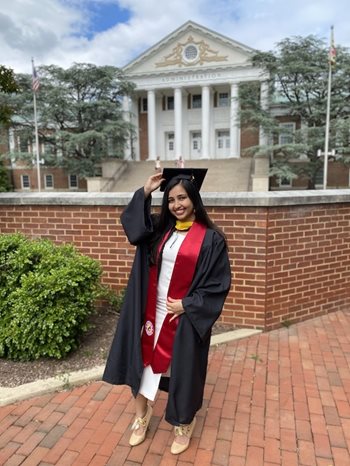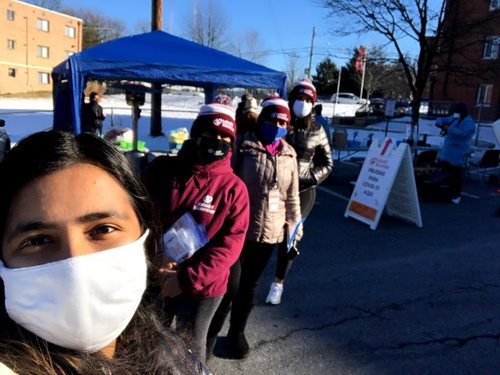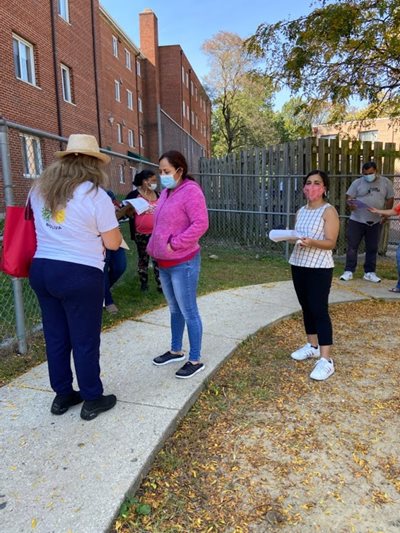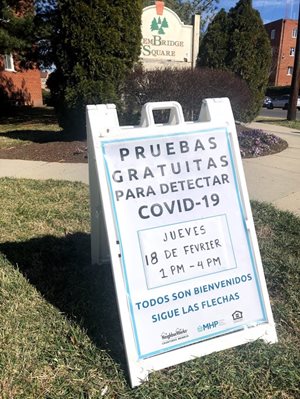Preeya Subedi has always had an interest in public health. Next year, she plans to go to medical school to start her studies, with a goal of becoming a doctor. But between graduating from the University of Maryland and beginning medical school, she wanted a job that would remind her of the needs of the people she'll eventually help as a doctor.
 Her path led her to AmeriCorps VISTA. "I'm a person who, when there are a lot of things going on, likes to think about what I can do about it," Subedi says. When she applied for the position, the pandemic had already begun, and she wanted to help.
Her path led her to AmeriCorps VISTA. "I'm a person who, when there are a lot of things going on, likes to think about what I can do about it," Subedi says. When she applied for the position, the pandemic had already begun, and she wanted to help.
Sudbedi is aware of the impact that housing has on health, she says, and the VISTA position with Montgomery Housing Partnership (MHP) seemed like a good match. She began in August, serving as the Health and Housing Coordinator at MHP. While working during the COVID-19 pandemic was challenging, it has also made her service feel more meaningful—especially her role coordinating weekly pop-up COVID-19 testing at MHP's properties.
In college, Subedi focused on diversity and inclusion, and when she began working on the health sites, she says, she connected with different minority health groups in Montgomery County, Maryland. She examined demographics and learned that some of the properties her organization worked with were 90% Black, a group that has been disproportionally affected by the pandemic. There was also a large Latino population. As a result, Subedi partnered with both the African American Health Program and the Latino Health Initiative as well, bringing promatoras, or community health workers, to talk directly with residents. They set up outdoor testing at multiple sites. The number of clients tapered off during the winter months, but now, she says, they're resuming their efforts again, having health workers reaching out to residents, and sharing health information.
"There was a lot of stigma and concern in the beginning," she says. "People said, 'I don't trust it. I don't need it.' Having someone from the community educate and share was super helpful."
When people came to the testing site, she says, staff also worked to connect them to other services, including food distribution. During the winter, they offered flu shots when residents came to be tested for COVID.
Subedi's efforts in coordinating these sites resulted in more than 1,000 COVID-19 tests being administered in the community. Another project she took on included finalizing and administering a community needs assessment to residents at the testing sites. In this survey they could talk about other concerns, especially those related to health. That led MHP to identify a need for healthy food. They also found several residents reporting issues with hypertension. Subedi says she's excited to apply the results with research and her background in public health. She plans to make recommendations for future health programs for residents who often lack health insurance, she says.
 Her service year also gave her the opportunity to attend Supplemental Nutrition Assistance Program (SNAP) training hosted by Maryland Hunger Solutions. She's used that training to make food distribution more efficient at MHP. "For example, we can now use QR codes connected to a Google form to easily sign residents up for food distribution pick up," she says.
Her service year also gave her the opportunity to attend Supplemental Nutrition Assistance Program (SNAP) training hosted by Maryland Hunger Solutions. She's used that training to make food distribution more efficient at MHP. "For example, we can now use QR codes connected to a Google form to easily sign residents up for food distribution pick up," she says.
She hopes to someday start her own nonprofit, focusing on cervical cancer screening for Nepali women. "So far, this experience has been an impactful reminder of why I want to serve underserved patient populations and how poverty can impact health," she says. Subedi will complete her post at the end of August. Over the months, residents have felt more comfortable about being tested. Subedi says that's important, as MHP waits for vaccine rollout.
Subedi and the other VISTA member worked closely with staff during the year as a means to keep them connected while everyone is working remotely. "As needs skyrocket among residents for food assistance, financial assistance, healthcare and more, partnerships with other organizations have been key," says Chris Gillis, VISTA supervisor at MHP. "There are external partnerships we have been able to create solely due to the pandemic, which we may not have otherwise been able to achieve," he says. "I have been very impressed with the professionalism and resourcefulness of our VISTAs in identifying partnerships which we had not previously contemplated."
Subedi says the year, though parts of it were completed remotely, has made her feel connected with the work, and the people she wants to help. In other words, her year with AmeriCorps has done exactly what she'd hoped it would do.
The AmeriCorps VISTA program began in 1965. Since NeighborWorks' VISTA program launched in 2009, more than 1,000 volunteers have completed service with the NeighborWorks network.
04/09/2021

